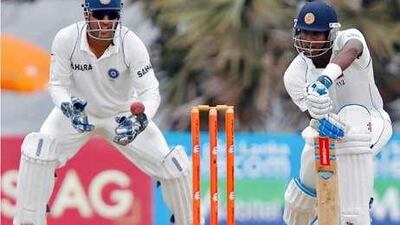George Bernard Shaw once described cricket as a "game played by 22 fools and followed by 22,000 fools". Now, Shaw did not really despise the sport - he "sneered at the games, but could not keep away", as CLR James, the cricket historian, observed.
Many of today's fans would fall into that category, especially on days when they have to sit through the ennui of Test matches between India and Sri Lanka on the lifeless pitches of the Emerald Isle. Fishing in a muddy hole would be a lot more entertaining. Even the batsmen themselves find it a yawn piling runs on such tracks.
"You needed extraordinary bowlers to take wickets on this pitch," Mahela Jayawardene, the Sri Lanka batsmen, wrote after the second Test at the Sinhalese Sports Club that saw only 17 wickets fall across five days of absolute drudgery.
If Test cricket needed a shot in the arm, this game was it. "We probably need more sporting pitches," Jayawardene added, and the curator at P Sara Oval listened to his plea. He has come up with a livelier wicket for the third Test, but after a gripping first session India's bowlers must have been wishing they could hire Leonardo DiCaprio's gang from the film Inception to plant ideas in the Sri Lankan batsmen's heads - namely to take unnecessary risks.
For the first time in this series, India had an early success in the innings. With Sri Lanka on 15, Ishant Sharma, in the middle of a probing spell, got the edge of Tharanga Paranavitana's bat. Their earliest wicket before this came with 50 runs on the board in the second innings of the last Test. With Sri Lanka on 59, Abhimanyu Mithun would have added a second but for Suresh Raina's recklessness at second slip. Kumar Sangakkara, on 23, stabbed at a delivery and the edge was going straight to VVS Laxman at second slip. It would have been a comfortable take, but Raina lunged out in front of his teammate and dropped the ball. That miss indicated another session of hard toil was in the offing for the Indian bowlers, but then, they had a wish come true. Tillakaratane Dilshan was run-out - off a no-ball to top it all - as he strolled down the pitch after pushing the ball to the off. Murali Vijay, at silly point, lunged to stop the ball and flicked it back to MS Dhoni, surprising Dilshan and catching him with his bat in the air. Sangakkara (75) also became the architect of his own downfall when he lofted Pragyan Ojha straight to Virender Sehwag at long-off. The Sri Lanka captain, looking in absolute command until then, left the crease enraged at himself. Jayawardene and Thilan Samaraweera, however, kept the errors to a minimum, until Ojha got the latter's wicket with a ball that gripped and straightened off the pitch.
That dismissal would have certainly pleased spinners on either side; it promises plenty for their ilk and an even battle between ball and bat as the match progresses. With the quality of batsmen in both teams, it should make for an engrossing spectacle. That is what Test cricket is all about.
Shaw's "22,000 fools" - and a few million more watching on television - will not be sneering then.
arizvi@thenational.ae
Sri Lanka (1st innings): T Paranavitana c Dhoni b Sharma 8 T Dilshan run out 41 K Sangakkara c Sehwag b Ojha 75 M Jayawardene lbw b Ojha 56 T Samaraweera not out 65 A Mathews not out 26 Extras: (b-4, lb-2, nb-14, w-2) 22 Total: (four wickets, 86.5 overs) 293 Fall of wickets: 1-15 2-102 3-157 4-241 Bowling (to date): Mithun 17.5-2-57-0 (2-w), Sharma 15-4-49-1 (3-nb), Mishra 25-1-99-0 (6-nb), Ojha 26-2-78-2 (4-nb), Sehwag 3-0-4-0 (1-nb).

Good start for Sri Lanka but nobody's amused
The lifeless pitches make watching games on the Emerald Isle a drudgery for fans as hosts rake up 293 for four on first day.
Most popular today
